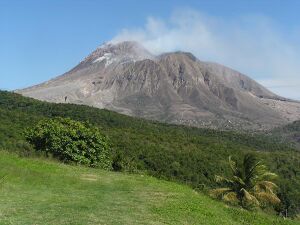Earth:Chances Peak
| Chances Peak | |
|---|---|
 | |
| Highest point | |
| Elevation | 915 m (3,002 ft) [note 1] |
| Prominence | 915 m (3,002 ft) |
| Coordinates | [ ⚑ ] : 16°42′40″N 62°10′38″W / 16.71111°N 62.17722°W |
| Geography | |
Lua error in Module:Location_map at line 522: Unable to find the specified location map definition: "Module:Location map/data/Montserrat" does not exist.
| |
| Location | Montserrat, Caribbean |
| Country | |
| Geology | |
| Mountain type | Stratovolcano |
| Last eruption | January 3, 2009 |
Chances Peak is a summit of the active complex stratovolcano named Soufrière Hills, the youngest volcanic complex on the island of Montserrat, a British overseas territory located in the Caribbean Sea. It was the highest point on the island until the mid-1990s, when fluctuating volcanic domes during the 1995–1999 Soufrière Hills eruptions eclipsed the peak in height.[1] The Soufriere Hills volcano is on a destructive plate margin, and is part of the Eastern Caribbean Volcanic Arc. This volcanic arc lies on the Caribbean plate, and has formed by subduction of the North American Plate beneath it.
On 17 September 1965 a Boeing 707 aircraft operating as Pan Am Flight 292 flew into Chances Peak near the summit and was destroyed, killing the 30 people on board.[2]
English's Crater
In 1936, the British geologist Archie MacGregor carried out geological fieldwork across Montserrat, as a part of a Royal Society expedition in response to an ongoing seismic crisis.[3] MacGregor noted that the peak of what he called Chance's Mountain formed the highest point on the island (3002 feet, at that time). Following discussions with a local resident, Thomas Savage English, MacGregor's mapping confirmed that the region to the East of Chance's Peak summit was a breached volcanic crater. MacGregor called this 'English's Crater', and identified this structure on the geological map which accompanied his report. MacGregor also confirmed English's interpretation, that English's Crater contained the volcanic plug or remnants of an old volcanic dome, called Castle Peak or Castles Peak. The first recorded eruption of Montserrat of the modern era began within English's Crater, in July 1995.[4]
See also
- Geography of Montserrat
- List of volcanoes in Montserrat
Notes
- ↑ This elevation is for Chance's Peak, the traditional high point. However the lava dome in English's Crater is currently (2006) estimated at over 930 metres (3,051 ft) : see The CIA World Factbook on Montserrat.
References
- ↑ "Montserrat". 17 August 2024. https://www.britannica.com/place/Montserrat-island-West-Indies.
- ↑ Aviation Safety Network N708PA accident synopsis retrieved 2010-06-14
- ↑ MacGregor, A. G. (1938). "The Royal Society expedition to Montserrat, B. W. I. - the volcanic history and petrology of Montserrat, with observation on Mt Pelé, in Martinique". Philosophical Transactions of the Royal Society of London. Series B, Biological Sciences 229 (557): 1–90. doi:10.1098/rstb.1938.0002. Bibcode: 1938RSPTB.229....1M. https://royalsocietypublishing.org/doi/10.1098/rstb.1938.0002.
- ↑ "Global Volcanism Program | Soufrière Hills". https://volcano.si.edu/volcano.cfm?vn=360050#bgvn_199506.
External links
- Montserrat Volcano Observatory (MVO) - Current monitoring of the Soufrière Hills Volcano in Montserrat.
- USGS Info on Soufrière Hills Volcano
- British Geological Survey
 |
